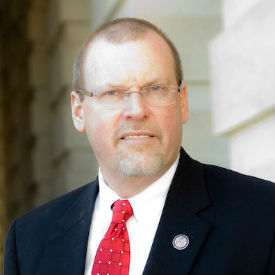
Many of us know someone who has suffered from opioid addiction. It’s an affliction that does not recognize race, sex, class, or party affiliation. And it has taken too many lives before their time. I have personally known people with these stories, and I’ve heard from many of you that have, too.
I’ve written several times in this column recently about the opioid crisis, “The Crisis Next Door,” and about efforts in Congress, and particularly in the House Energy and Commerce Committee that I serve on, to alleviate it. But each week seems to bring fresh reminders about the devastation opioids have wrought on many of our communities.
Among the most powerful testimonies was a roundtable sponsored by the Energy and Commerce Committee on April 19. Although the House was not voting that day, several of my colleagues and I believed it was important to stay for this event before we returned to our districts. Our guests at the roundtable were people who had known the pain of opioid addiction from a very close perspective: most of them had lost a child to it.
Although they had that terrible scar in common, opioids inflicted it in different ways. The opioid epidemic shows itself in the lives of its victims in various ways, from abuse of prescription pills to use of illegal substances such as fentanyl.
Each story I heard was powerful, but to illustrate how varied the opioid crisis is, here are three in particular: Aimee Manzoni D’Arpino’s son Emmett lost his life in a heroin overdose. Michael Gray’s daughter Amanda was killed by pure fentanyl. Gary Mendell’s son Brian took his own life after struggling with addition for years.
Solving this problem requires us to look at it from every angle. Doctors, pharmacists, law enforcement officers, public officials, just to name a few professions, all have roles to play. Civic and charitable organizations, universities, the private sector, and the government all can contribute to improving treatment and prevention of opioid addiction.
My colleagues and I in Congress have been considering what we can do at the federal level. Several of us from both parties took to the floor of the House on April 18 to talk about how our constituents have been affected by the opioid crisis and our ideas for addressing it.
In my remarks, I spoke about the pill dumping that took place in small West Virginia towns not far from the Ninth District’s borders. The Subcommittee on Oversight and Investigations, which I serve as Vice Chairman, uncovered details of these possible abuses as we looked at drug distribution and enforcement practices.
Another portion of my remarks detailed a bill I’m working on to improve information-sharing between states about prescription drugs. Most states have a Prescription Drug Monitoring Program (PDMP). My bill would require certain federal agencies to coordinate their efforts to improve how PDMPs gather information so medical professionals can have the best, most timely information they can get.
This draft and likely dozens of other bills will be considered at a Subcommittee on Health markup on April 25. The Subcommittee held three legislative hearings in 2018, in addition to numerous other opioid hearings in the Committee that have been held or are scheduled, to collect input on these proposed bills. During the markup, we will amend and vote on them. The full Committee will take them up next, with a goal of sending them to the floor of the House before Memorial Day.
Even taken together, these bills won’t solve the crisis, but they will help. We owe it to those families who have suffered and are suffering now to do what we can.
Many of their stories are heartbreaking, but not all end in sadness. I’ve met with people who have struggled with opioids now on the road to recovery. Their determination inspires me.
My colleague, Congressman David McKinley (R-WV), recently mentioned a company in his district that intentionally tries to hire recovering addicts. They are offering a second chance – something we all could likely use no matter our problems. I pray that soon we see fewer lives cut short and more second chances.
In Congress, I will continue to work to solve the problem and create second chances.
If you have questions, concerns, or comments, feel free to contact my office. You can call my Abingdon office at 276-525-1405 or my Christiansburg office at 540-381-5671. To reach my office via email, please visit my website at www.morgangriffith.house.gov.










